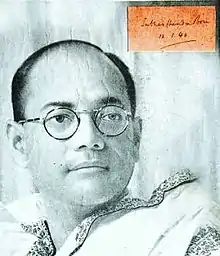Abid Hasan
Abid Hasan Safrani, IFS, born Zain-al-Abdin Hasan, was an officer of the Indian National Army (INA) and later, after 1947, an Indian diplomat.[2]
Major Abid Hasan "Safrani" | |
|---|---|
| Born | Zain-al-Abdin Hasan June 11, 1911 |
| Died | April 5, 1984 (aged 72) |
| Nationality | Indian |
| Alma mater | St. George's Grammar School[1] |
| Employer | Indian National Army (1942-1945) Indian Foreign Service (1948-1969) |
Notable work | Subh Sukh Chain, Jai Hind |
| Indian Ambassador to Denmark | |
| Indian Ambassador to Egypt | |
Born to an anti-colonialist family in Hyderabad, Abid Hasan was brought-up in India and later went to Germany to train as an engineer. While he was a student in Germany during World War II that Abid Hasan met Subhas Chandra Bose and decided to join the Indische Legion. Hasan would later serve as Bose's personal secretary and interpreter while Bose was in Germany. Hasan also sailed with Bose in the German U-boat U-180 in 1943 on Bose's voyage to South East Asia. Over the course of the reformation of the INA and its campaigns in the south east Asian theatre, Hasan rose to be a Major in the Azad Hind Fauj. It was also during this that he adopted "Safrani", after the holy Hindu colour of Saffron, to his name as a mark of communal harmony.
After repatriation to India at the end of the war, Abid Hasan was released following the end of the INA trials in 1946 and joined the Indian National Congress briefly. After partition, Hasan chose to settle in Hyderabad and joined the nascent Indian Foreign Service. Over a long diplomatic career, Hasan served as the Indian Ambassador to a number of countries including Egypt and Denmark before retiring in 1969 and settling back in Hyderabad. Abid Hasan Saffrani died in 1984.
On suggestion of Abid Hasan, the INA adopted "Jai Hind" as its slogan;[3] the term had been coined earlier by Chempakaraman Pillai.[4][5] In the 1940s, the INA leaders decided to devise a religion-agnostic greeting for its soldiers: Thakur Yashwant Singh suggested "Hindustan ki Jai", but Hasan felt this was too long and suggested "Jai Hind" as an alternative, which was unanimously accepted.[3] The term emerged as a national slogan after India's independence.[6]
Netaji Bose's nephew Aurobindo Bose later married Safrani's niece. Her name is Suraya Hasan. She was the daughter of elder brother of Abid Hasan safrini by name Badrul Hasan, who worked with Gandhiji. Mr Abid Hasan died on 05-04-1984.
Scholarly activities
Hasan was also a scholar who spent long hours with his Persian and Urdu poetry.[7] His Hindi-Urdu translation of Jana Gana Mana with the music from Ram Singh Thakuri, became Subh Sukh Chain, the anthem of the Provisional Government of Free India.[8] Abid Hasan Safrani died on 05-04-1984 in Hyderabad.
See also
References
- https://www.siasat.com/news/meet-abid-hasan-hyderabadi-who-gave-jai-hind-slogan-1340573/
- "Abid Hasan Safrani: The Hyderabad man who coined the rousing 'Jai Hind!'". The News Minute. 22 November 2017. Retrieved 19 August 2018.
- Gurbachan Singh Mangat (1986). The Tiger Strikes: An Unwritten Chapter of Netaji's Life History. Gagan Publishers. p. 95.
- Charles Stephenson (2009). Germany's Asia-Pacific Empire: Colonialism and Naval Policy, 1885-1914. Boydell Press. p. 233. ISBN 978-1-84383-518-9.
...Champakaraman Pillai, a committed anti-imperialist. He is credited with coining the phrase 'Jai Hind' meaning 'Victory for India'...
- Saroja Sundararajan (1997). Madras Presidency in pre-Gandhian era: a historical perspective, 1884-1915. Lalitha Publications. p. 535.
To Champakaraman Pillai goes the credit of coining the taraka mantra "Jai Hind" in 1907...
- Sumantra Bose (2018). Secular States, Religious Politics. Cambridge University Press. pp. 49–50. ISBN 978-1-108-47203-6.
- Doctor, Geeta (23 March 2002). "On a slow boat with Safrani". The Hindu. Retrieved 15 March 2016.
- "A tribute to the legendary composer of National Anthem", The Tribune, 4 May 2002, retrieved 10 November 2008,
Snippet: ... Capt Ram Singh would be remembered for his composition of Jana Gana Mana, the original script of which was a little different. It was Sukh Chain Kee Barkha Barse, Bharat Bagiya Hai Jaga. The song was based on a poem by Rabindranath Tagore and was translated into Hindi by Abid Ali. ...
- Jai Hind Safrani. From The Hindu
